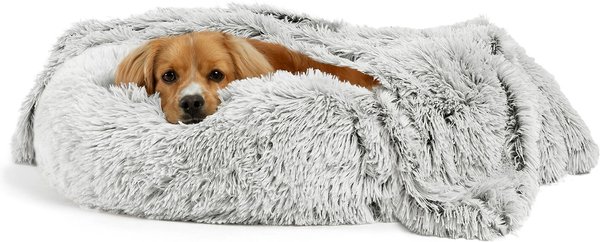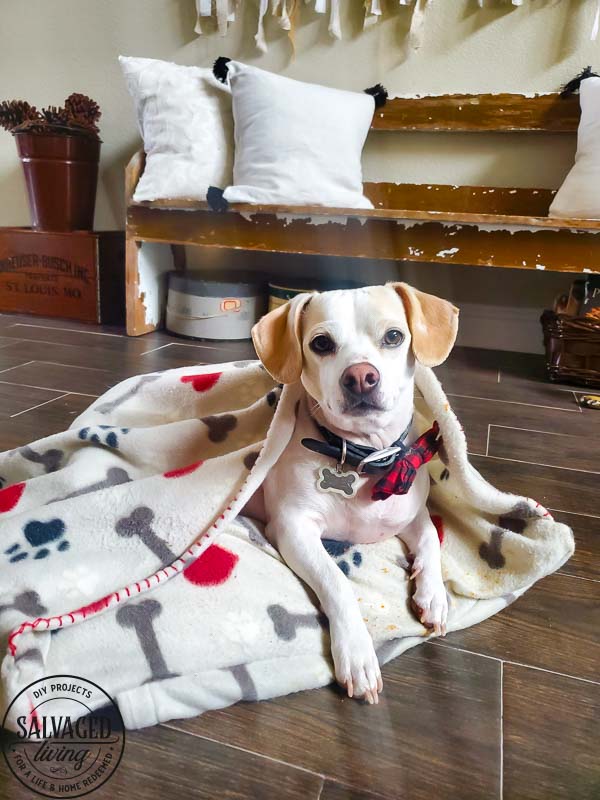You may have wondered whether a blanket can serve as an alternative to a traditional dog bed. Many pet owners have pondered this question, unsure if their furry friend would find comfort in a simple blanket. In this article, we will explore the possibility of using a blanket as a dog bed and discuss the factors to consider when making this decision. Whether you are seeking a cost-effective solution or looking for a temporary fix, read on to find out if a blanket could be the perfect resting spot for your beloved canine companion.
Can a blanket be used as a dog bed?

Considerations for using a blanket as a dog bed
If you’re considering using a blanket as a dog bed, there are a few important factors to keep in mind. First, you’ll want to consider the size and breed of your dog. Larger dogs may require more support and padding than a blanket can provide. Additionally, you’ll need to take into account your dog’s sleeping habits. Some dogs may enjoy curling up in a snug blanket, while others may prefer a more open space. Finally, consider the durability and washability of the blanket. Dogs can be messy, so choosing a blanket that is easy to clean will be essential.
Choosing the right blanket for your dog
When choosing a blanket to use as a dog bed, there are a few key factors to consider. First, look for a blanket that is made from durable, pet-friendly materials. Avoid blankets with loose threads or delicate fabrics that can easily be damaged by your dog’s nails or teeth. Additionally, consider the thickness and insulation of the blanket. While some dogs prefer a thicker blanket for added comfort, others may overheat easily and prefer a lighter, more breathable option. Lastly, choose a blanket that is the appropriate size for your dog, allowing them to stretch out comfortably while also providing a sense of security.
Benefits of using a blanket as a dog bed
Using a blanket as a dog bed can offer several benefits for both you and your furry friend. Firstly, blankets are typically more budget-friendly compared to traditional dog beds, making them an affordable option for pet owners. Additionally, blankets are versatile and can easily be moved around the house or used for travel, allowing your dog to always have a familiar and comfortable spot to rest. Furthermore, blankets can help regulate your dog’s body temperature, providing warmth during colder months or a cooling surface during hot weather. Finally, using a blanket as a dog bed can give your dog a sense of security and comfort, as they can burrow or nestle into the soft fabric.
Potential drawbacks of using a blanket as a dog bed
While there are many benefits to using a blanket as a dog bed, it’s important to be aware of potential drawbacks as well. One potential downside is that blankets may not provide enough support and padding for dogs with joint issues or older dogs who need extra comfort. In these cases, investing in a specialized orthopedic dog bed may be more beneficial. Additionally, some dogs may be more prone to chewing or digging, and a blanket may not withstand their sharp teeth or claws. This could result in damage to the blanket or even pose a choking hazard if your dog ingests any small pieces. Lastly, if your dog has certain allergies or sensitivities, certain materials or fabrics in the blanket may cause skin irritation or discomfort.

Creating a comfortable space with a blanket
To maximize comfort when using a blanket as a dog bed, there are a few steps you can take. First, find a quiet and peaceful area in your home where your dog can relax undisturbed. Consider placing the blanket in a cozy corner or against a wall to provide a sense of security. You can also add a few of your dog’s favorite toys or a familiar-scented item to enhance their comfort. Additionally, make sure the blanket is clean and free from any strong odors that may bother your dog.
Adding extra padding to a blanket dog bed
If you find that a blanket alone doesn’t provide enough cushioning for your dog, you can easily add extra padding to enhance their comfort. Place a soft pillow or a foam pad underneath the blanket to provide additional support for your dog’s joints and muscles. This will help alleviate any pressure points and improve overall comfort. Alternatively, you can consider using a thicker blanket or layering multiple blankets to create a more plush sleeping surface. Remember to regularly check the padding for signs of wear and tear, as worn-out materials may lose their supportive properties and need to be replaced.

Maintaining and cleaning a blanket dog bed
Regular maintenance and cleaning are essential when using a blanket as a dog bed. Keep an eye out for any dirt, hair, or stains on the blanket and remove them promptly to maintain cleanliness. Depending on the material of the blanket, you can either toss it in the washing machine or hand wash it. Be sure to follow the manufacturer’s instructions for care to prevent any damage to the blanket. It’s a good idea to have an extra blanket on hand so that you can rotate them while one is being cleaned, ensuring your dog always has a fresh and clean sleeping surface.
Alternatives to using a blanket as a dog bed
While using a blanket as a dog bed can be a suitable option for many dogs, there are alternatives to consider. If your dog requires extra support and comfort, investing in an orthopedic dog bed with memory foam or specialized cushioning may be a better choice. These beds are designed to provide optimal joint and muscle support, especially for older dogs or those with arthritis. Additionally, raised dog beds or cot-style beds can be beneficial for dogs who prefer a cooler sleeping surface or for use outdoors. It’s important to assess your dog’s specific needs and preferences when considering alternative dog bed options.

Tips for using a blanket as a dog bed
If you decide to use a blanket as a dog bed, here are a few helpful tips:
- Choose a blanket made from durable and pet-friendly materials to withstand your dog’s activity.
- Size the blanket appropriately to allow your dog to stretch out comfortably.
- Consider adding extra padding, such as a soft pillow or foam pad, to enhance comfort.
- Regularly clean the blanket to maintain hygiene and remove any dirt or odors.
- Monitor your dog’s behavior to ensure they are not chewing or digging at the blanket excessively.
- Provide a quiet and peaceful space for your dog’s blanket bed, away from high traffic areas or loud noises.
- Check the blanket periodically for any signs of wear and tear and replace as needed to ensure safety.
Final thoughts on using a blanket as a dog bed
Using a blanket as a dog bed can be a cozy and cost-effective option for providing your furry friend with a comfortable sleeping space. By considering your dog’s size, sleeping habits, and comfort needs, you can choose the right blanket and create a relaxing environment. While a blanket may not be suitable for all dogs, it can offer warmth, security, and versatility for many canine companions. Remember to regularly maintain and clean the blanket, and keep an eye out for any signs of discomfort or damage. Ultimately, the most important factor is ensuring your dog feels safe, secure, and content in their sleeping area.






